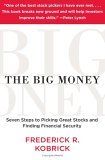Here is the Winner of The Big Money by Fred Kobrick
Earlier this week, I participated in JLP’s Question of the Day Marathon by asking about readers’ childhood experiences with money. The question received a number of great responses.
 To spice up the event, I added a giveaway. One lucky random commenter will receive a free copy of The Big Money: Seven Steps to Picking Great Stocks and Finding Financial Security
To spice up the event, I added a giveaway. One lucky random commenter will receive a free copy of The Big Money: Seven Steps to Picking Great Stocks and Finding Financial Security, by Frederick Kobrick. Perhaps the giveaway inspired readers to comment, because there were a number of great responses. Here was the official question:
While growing up, what were you taught about personal money management by your immediate family and surroundings (directly or by example, positive or negative), and how do these ideas factor into your life now?
Blaine Moore answered:
I am sure that I was taught a lot by example, since I seem to have a pretty good idea of what I am doing now and had a good base to build off of. I do not specifically remember many lessons though.
This is the case for many people, I think. Parents may not have taught specific lessons, but by modeling good behavior with money, they teach their children how to behave and manage money appropriately. Children can learn from negative examples as well, as Jason did:
Well, most of the teaching I received was by examples of what not to do. Sadly, most of my family was pretty bad when it came to money. The majority lived above their means instead of saving, kept credit card balances, didn’t put away money for retirement etc… I do think that growing up in a middle to lower class background is normally good for teaching people that you can’t have everything and you have to make priorities. But some of that goes out the window when your parents splurge on you every christmas and birthday.
Here’s an excerpt from the winner of The Big Money:
eventho my mother weas/is good at frittering away $ regularly on ‘sales’ and ‘good deals’ etc, my parents saved really well. we lived like lower middle class i guess (never went anywhere far, nor on any real vacations, had inexpensive cars, only moved once in my childhood, etc) and that surely helped. i know they paid cash for things like vehicles and paid off the house as soon as they could. unfortunately, they didn’t discuss the ins and outs of $ much at all, apart from complaining about what things costs and that ‘we don’t have $ for thatâ€Â?….etc etc. they never told us what their income was (only dad worked) and what things cost, like the mortgage, electricity. so there was still a lot of mystery about the whole thing. also, they always had their own ideas on how to do things and wouldn’t take advice from anyone. i didn’t understand how other family members lived so much better and how my parents were really set in their ways and ideas and closed to most other things.
i think positively, it affected me in that my part time 3 to 4 hr a week minimum wage job in high school enabled me to escape (all was not good on the home front; abuse). i saved most of my income and temped the summer after i turned 18 and managed to save $500 total which i used that september to move far, far away to san francisco by the seat of my pants (yes, it was a success). but you know what? most of this savings acheivement was simply from being unbelievably mostivated to exit that house and never look back. feelings i intensely had since extremely young.
Congratulations, ib! Your book will be in the mail shortly.


Article comments